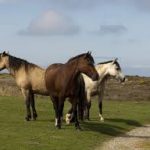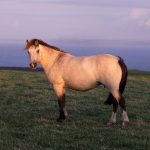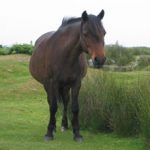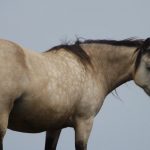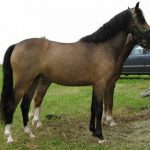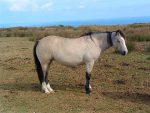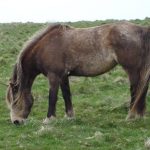Lundy Pony
The Lundy Pony is an English equine breed acquiring its name from England’s Lundy Island, where it was developed. Their hardy nature and gentle disposition make them ideal to be used for shows and as mounts for children.
Lundy Pony Pictures
- Images of Lundy Pony
- Lundy Pony Horse
- Lundy Pony Images
- Lundy Pony Photos
- Lundy Pony Pictures
- Lundy Pony Stallion
- Lundy Pony
- Lundy Ponys
Quick Information
| Temperament/ Personality | Gentle, hardworking, friendly, strong, loyal and patient |
| Physical Characteristics | Neat elegant head with a slightly convex profile; strong, compact bodies; good bone formation; wide and deep chest; well-set, muscular neck; strong, compact back; short and strong legs; robust hindquarters; and a thick mane |
| Colors | Dun, bay, palomino, roan and liver chestnut |
| Common Use | Show horse, riding horse and as children ‘s mount |
| Height | Approximately 13.2 hands |
| Weight | About 800 pounds |
| Life span | 25 to 30 years |
| Health | This hardy breed has no known breed related health issues as such |
| Popular Traits | Hardy, strong and attractive |
| Feeding/ Diet | Hay and grain are the popular food sources |
| Country of Origin | England |
| Year of development | 1928 |
| Ancestors | New Forest Pony, Connemara Pony, Welsh Mountain B pony and the Arabian horse |
Lundy Pony Video
History
These ponies originated in the year 1928, when Martin Coles Harman, the owner of Lundy Island, brought in a host of horses that included 34 mares of the New Forest Pony breed, eight foals ( belonging to the Connemara and Arabian breeds) as well as a strawberry roan stallion of the Welsh Mountain B origin. His purpose of spending a high budget in importing all these horses to the island was his desire for creating a stylish breed having a great height.
The Welsh stallion that he had brought died just in a year’s time, being able to parent a single foal named Pepper, which was the first Lundy Pony. Pepper grew up to be an amazing stud stallion acquiring a creamy dun hue with his mane and tail being black. In two years time the island was full of ponies roaming around the place. In fact, they were so many in numbers that approximately 50 of them were sold to the mainland. However, during the Second World War, the shipping of ponies were impossible, rising thus their numbers rising to about 100. As the stallions were in constant conflict with each other their numbers had to be reduced.
In 1969, the island had been sold, after which a National Trust undertook the responsibility of looking after these ponies, till 1980, after which the entire herd was shifted to Cornwall. Some of them were even brought to New Devon. The Lundy Pony Society was formed in the year 1984 with the purpose of looking after the betterment of this breed. The organization even took initiatives bringing back some of the mares and foals to their original homeland—–Lundy Island.


